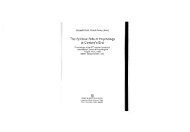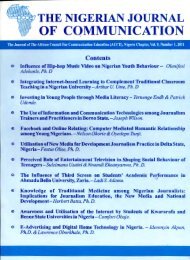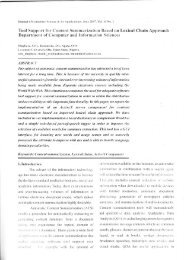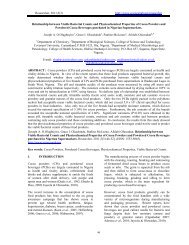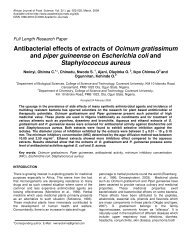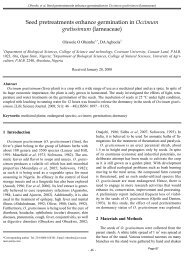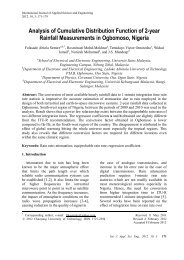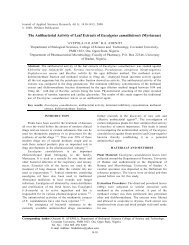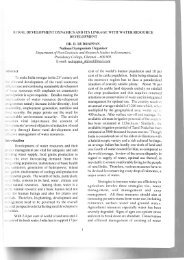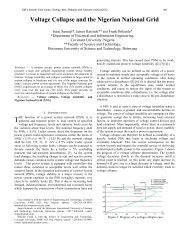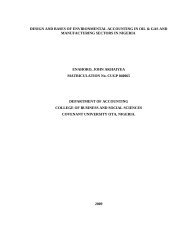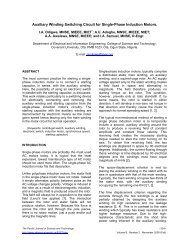Download (8Mb) - Covenant University Repository
Download (8Mb) - Covenant University Repository
Download (8Mb) - Covenant University Repository
Create successful ePaper yourself
Turn your PDF publications into a flip-book with our unique Google optimized e-Paper software.
The implication of this is that, once a woman loses her husband, her<br />
inheritance is more in terms of liabilities than assets. She is subject to sexual<br />
harassment from younger male in-laws who view her as part oftheir relative's property<br />
to be inherited, which invariably implies that a woman cannot aspire to own property.<br />
Since the women have no control over land and are often in subordinated positions,<br />
they are sometimes subjected to dehumanizing treatment from male relations and male<br />
in-laws when ever request for land is put forward to them. Even when such requests are<br />
granted, women suffer from inconsistent and temporary use of land despite their<br />
contributions to food production in the community.<br />
There is a clear understanding that with increased agricultural production,<br />
there will be an expansion in farm income which invariably will stimulate the demand<br />
for non-farm products. There are however special constraints facing women's<br />
agricultural life leading to a reduction in economic growth. According to the World<br />
Bank 1989; Cleaver and Schreiber 1994, most working women are employed in<br />
agriculture and many ofthe constraints facing them exist in the rural economy. These<br />
include legal and customary constraints on land ownership and access to credit; work<br />
burdens on women in addition to farming, including household management, water<br />
and fuel wood collection, and cultural constraints on women's use of land for<br />
agricultural purposes.<br />
It is quite obvious therefore that agriculture is critical to Africa's economic,<br />
social and rural development. But in most African countries like Nigeria, agricultural<br />
performance has not achieved the ambitious objectives set out for it. The result has<br />
been continuing high rural poverty. It is imperative to state here that Nigeria faces<br />
serious poverty challenges and it is estimated that two-thirds ofNigerians now live<br />
below the poverty line of IUS$ per day, most ofthem in rural areas.<br />
The critical question that this scenario raises then is, how does one reconcile a<br />
situation, where a woman who is perhaps widowed and completely depends on land for<br />
her survival is denied access to land by those who may not necessarily need it? This<br />
becomes very worrisome when women who spend several hQurs everyday working on<br />
land are often denied ownership of land. Limiting women's access to and control of<br />
land invariably limits their ability to produce enough food and this affects the wellbeing<br />
oftheir families. .<br />
It is pertinent to state that in terms offood crop production, women engage in<br />
bush clearing, planting, weeding and harvesting ofthe crops to feed their families, the<br />
community and the society at large. Yet, the women cannot own or inherit land. This<br />
makes their work to produce sufficient food more difficult which also affects their<br />
income generating capacity and living condition.<br />
The challenge facing women in Nigeria therefore, involves the interplay<br />
between access to land and ownership oflandand how this has affected thechallenge to<br />
agricultural production and food security. Coupled with this is the patriarchal structure<br />
across societies in the country which has accorded women low status and also created<br />
severe cultural inhibitions against the women which have greatly affected their<br />
inheritance rights especially that ofland for agricultural purposes.<br />
A critical issue affecting women's food production capacity is the subservient<br />
role ofthe statutory law to the customary law of land tenure. Ownership of land and<br />
other forms of inheritance under the customary laws are very discriminatory aletlnst<br />
female children, especially when parents do not usually document all their assets in a



